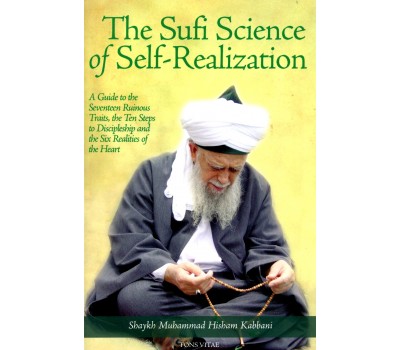The Sufi Science of Self-Realization
- Product Code: BK0395
- Availability: Out Of Stock
- Book Binding: Paper Back
- Book Author: Shaykh Muhammad Hisham Kabbani
-
£18.99
A Guide to the Seventeen Ruinous Traits, the Ten Steps to Discipleship, and the Six Realities of the Heart. Shaykh Muhammad Hisham Kabbani, shaykh of the Naqshbandi Sufi Tariqah, has composed a treatise on the geography of the soul, beginning with the seventeen destructive traits of the heart and ending with the six latent, marvelous powers of the heart. This book, aimed at laypersons and those unfamiliar with Sufi terminology, provides an invaluable window into the living, ancient discourses of mystical Islam, wherein gnostic interpretations of Quranic scripture, hadith and traditional sciences such as numerology are all incorporated into a map of the soul's potential states, stations and pitfalls on its way back to God.
He introduces his spiritual analysis as a science of self-realization, reclaiming the original meanings of science as knowledge - with knowledge of self as the most powerful and complex realm of understanding: "The foundations of modern science now rest upon an understanding of the inter-relatedness of the soul and the world." Even Newton, icon of modern science, based his studies in alchemy, the traditional science linking the microcosm of the soul to the macrocosm of the elemental cosmos. Moreover, Kabbani addresses the contemporary technological sciences of cell phones, the internet, jet flights and digital memory as imitations of the traditional powers of spiritual teachers. This is a fascinating and persuasive assertion, one that demands more attention, in that it speaks to the originary goals of science: to actualize latent powers of the soul itself in its ongoing quest for contact with knowledge across times and spaces.
The other aspect of this books value is its suggestion of self-auditing (muhasabah). Addressing the consciousness of the readers, Kabbani points out how self-destructive habits such as anger, depression and stinginess persist when unacknowledged. Liberation from such ruinous routines requires our recognition of the alternatives, first and foremost. The practice of devotion necessitates discipline and begins with astute self-examination and concurrent contemplation. Kabbani carefully outlines the specific behaviors and qualities to look out for. Here, he offers perceptive psychological insight to the journey from patterns of malice, heedlessness and attachment through exercises of migration and meditation, standing up for truth and listening, to concentration on the six powers that open and actualize the heart. Filled with gems of counsel and guidance, this work invites those within and outside of the Sufi traditions to step up their spiritual game via the sacred admonition and accumulated wisdom of the Sufi science of self-realization. As Kabbani effectively reveals, the time is nigh.
.jpg)
